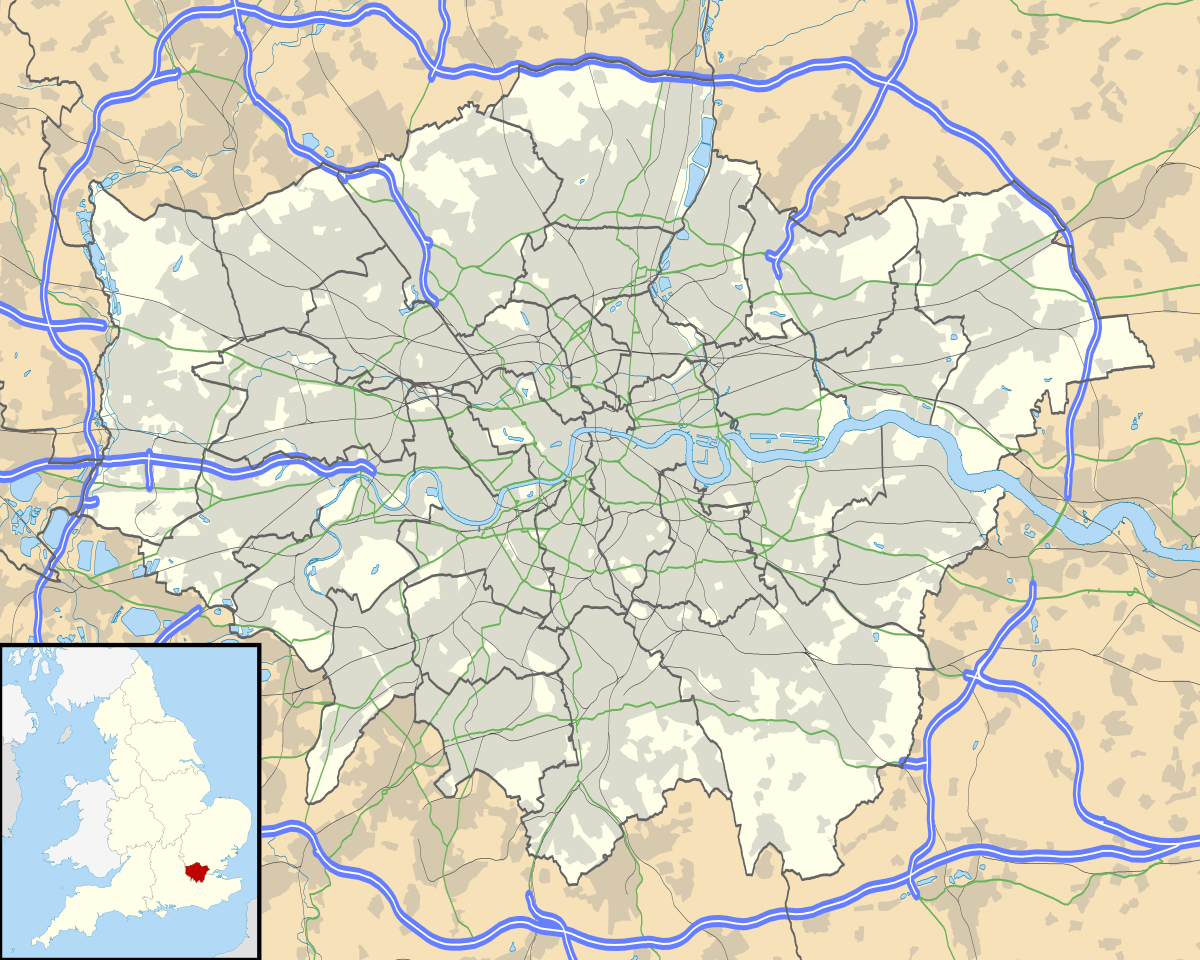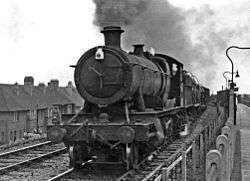East Acton tube station
East Acton is a London Underground station in East Acton in west London. The station is on the Central line, between White City and North Acton stations, and in Travelcard Zone 2. It is close to Wormwood Scrubs prison and Queen Charlotte's and Chelsea Hospital.
| East Acton | |
|---|---|
 | |
 East Acton Location of East Acton in Greater London | |
| Location | East Acton |
| Local authority | Hammersmith & Fulham |
| Managed by | London Underground |
| Number of platforms | 2 |
| Fare zone | 2 |
| London Underground annual entry and exit | |
| 2014 | |
| 2015 | |
| 2016 | |
| 2017 | |
| 2018 | |
| Railway companies | |
| Original company | Great Western Railway |
| Pre-grouping | Great Western Railway |
| Post-grouping | Great Western Railway |
| Key dates | |
| 3 August 1920 | Station opened |
| Other information | |
| External links | |
| WGS84 | 51.51694°N 0.24750°W |
Location
The station is located on Erconwald Street and is near the A40 Western Avenue connected via Old Oak Common Lane. It is also just outside the London Borough of Ealing and is instead in the London Borough of Hammersmith and Fulham. Though the name suggests, East Acton is not near the East Acton neighbourhood. The station, however, is near St Aidan of Lindisfarne RC Church and Wormwood Scrubs. Queen Charlotte's and Chelsea Hospital, Hammersmith Hospital, HM Prison and Imperial College Hammersmith branch are accessible from the station.[3]
History


In 1905, the Great Western Railway (GWR) proposal to construct the Ealing & Shepherd's Bush Railway (E&SBR) so that it would connect its main line route at Ealing Broadway to the West London Railway (WLR) north of Shepherd's Bush was approved by Parliament.[note 1] Construction had not started and in 1911, the Central London Railway (CLR, now part of the Central line) and GWR agreed running powers for CLR services to continue from Shepherd's Bush to Ealing Broadway using the GWR route. The CLR request for a short extension from Wood Lane to connect to the E&SBR tracks gained parliamentary approval on 18 August 1911 under the Central London Railway Act, 1911.[5][6] The GWR constructed the new E&SBR line.[note 2] Electrification of the track did not begin until after the end of the First World War. When complete, CLR services started on 3 August 1920 where East Acton was opened as the only intermediate station.[7][8][9]
Since the CLR was exclusively a passenger service, two extra dedicated tracks for the GWR's freight trains were opened in 1938, but were closed in 1964.[10] The trackbed of these rails is now overgrown with vegetation, visible immediately to the north of the station.
Services and connections
Services
East Acton is served by the Central line between North Acton and White City.[13] To the east, the two tracks change direction to continue to White City.[14][15]
The typical off-peak service in trains per hour (tph) is:[15]
- 9 tph eastbound to Epping
- 3 tph eastbound to Loughton
- 6 tph eastbound to Hainault via Newbury Park
- 3 tph eastbound to Woodford via Hainault
- 9 tph westbound to West Ruislip
- 3 tph westbound to Northolt
- 9 tph westbound to Ealing Broadway
Night Tube services also serve the station, with a frequency of 3 tph in both directions.[16]
Connections
London Buses routes 7, 70, 72, 95, 228, 260, 272 and 283, and Night Bus route N7 serve the station.[17]
Notes and references
Notes
- According to Transport for London (TfL), the Central London Railway abandoned its policy of through services not sharing tracks with any other railway from this proposal.[4]
- The line opened as a steam-hauled freight only line on 16 April 1917.
References
- "Multi-year station entry-and-exit figures (2007-2017)" (XLSX). London Underground station passenger usage data. Transport for London. January 2018. Retrieved 22 July 2018.
- "Station Usage Data" (CSV). Usage Statistics for London Stations, 2018. Transport for London. 21 August 2019. Retrieved 27 April 2020.
- East Acton - Google Maps (Map). Retrieved 23 November 2018.
- "Central line facts". Transport for London. Archived from the original on 2 December 2010. Retrieved 7 November 2018.
- Bruce & Croome 2006, p. 25.
- "No. 28524". The London Gazette. 22 August 1911. pp. 6216–6217.
- Bruce & Croome 2006, p. 26.
- Rose 1999.
- Day & Reed 2008, p. 124.
- Jackson, Alan A (1999). London's Local Railways. Capital Transport. ISBN 1-85414-209-7.
- "Buses Replace Trains as Track Replacement Works Take Place at East Acton" (Press release). Transport for London. 4 August 2005. Archived from the original on 23 November 2018. Retrieved 23 November 2018.
- "Station Refurbishment Summary" (PDF). London Underground Railway Society. July 2007. p. 5. Archived (PDF) from the original on 10 May 2015. Retrieved 23 November 2018.
- Standard Tube Map (PDF) (Map). Not to scale. Transport for London. January 2020. Archived (PDF) from the original on 14 April 2020.
- "Central line". Railfanning London's Railways. 25 March 2018. Archived from the original on 23 November 2018. Retrieved 23 November 2018.
- Clive, Feather (24 September 2018). "Central line". Clive's Underground Line Guides. Archived from the original on 23 November 2018. Retrieved 23 November 2018.
- Standard Night Tube Map (PDF) (Map). Transport for London. January 2019. Archived (PDF) from the original on 11 March 2019.
- "Buses from East Acton" (PDF). Transport for London. June 2016. Archived (PDF) from the original on 23 November 2018. Retrieved 23 November 2018.
Bibliography
| Wikimedia Commons has media related to East Acton tube station. |
- Bruce, J Graeme; Croome, Desmond F (2006) [1996]. The Central Line. Capital Transport. ISBN 1-85414-297-6.CS1 maint: ref=harv (link)
- Rose, Douglas (1999) [1980]. The London Underground, A Diagrammatic History. Douglas Rose/Capital Transport. ISBN 1-85414-219-4.CS1 maint: ref=harv (link)
- Day, John R; Reed, John (2008) [1963]. The Story of London's Underground. Capital Transport. ISBN 978-1-85414-316-7.CS1 maint: ref=harv (link)
| Preceding station | Following station | |||
|---|---|---|---|---|
| Central line | ||||
| Former route | ||||
| Preceding station | Following station | |||
Terminus | Central line (1920-1923) | towards Liverpool Street |
||
towards Ealing Broadway | Central line (1923-1946) | |||
| Central line (1946-1947) | towards Stratford |
|||
| Central line (1947-1947) | towards Leytonstone |
|||
| Central line (1947-1947) | ||||
| Service arrangement if Old Oak Common station is constructed | ||||
| Preceding station | Following station | |||
| Central line | ||||